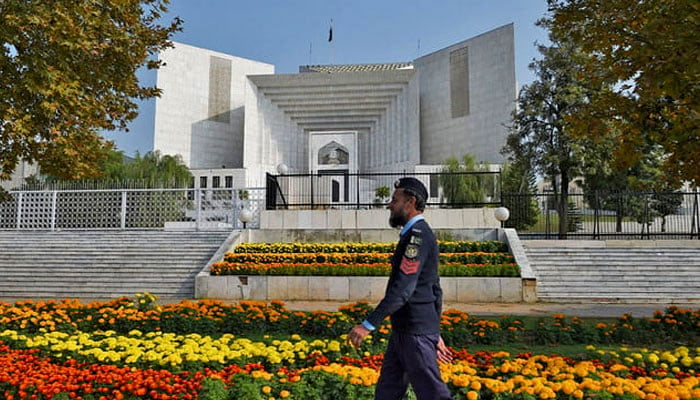From guardian to spectator
26th Amendment was not passed to correct the course of justice but to restrain its independent trajectory
August 03, 2025

The 26th Amendment to the constitution of Pakistan did not arrive quietly. It came on the heels of coerced obedience, after lawmakers were abducted and the legislature was forced to bend its will. It was not born of debate, deliberation or democratic consensus, but of duress, pressure and coercion. It entered the constitutional order like a monarchical decree whispered in the dark not shouted in the public square. And thus, it began: not as a reform, but as an undoing.
What makes the blow graver is the context in which the 26th Amendment emerged. Judges of the Islamabad High Court, alongside a few from other high courts and even the subordinate judiciary of Pakistan, had begun to raise their voices against deepening interference in judicial affairs by the executive. Their revolt against blatant interference was measured, constitutional, and dignified, which signalled that the judiciary was not yet tamed. But what followed was not dialogue. It was retribution masked as legislation. The 26th Amendment was not passed to correct the course of justice but to restrain its independent trajectory.
Where once the judiciary stood as the revered custodian of the constitution, it now lingers in the corridors of irrelevance, neither feared nor followed. The doctrine of separation of powers, so central in our constitutional parlance, has been violated not in theory alone, but in the bloodstream of the state. Montesquieu, that watchman of liberty, warned that tyranny begins when legislative, executive and judicial powers are held by the same hands. The justice system turns into an instrument.
Appointments that were once determined by judges themselves – they were imperfect, yes, but insulated – are now subject to the executive’s grip. The Judicial Commission has been reshaped, diluted and turned into a platform where political influence can speak louder than merit. Where wisdom once sat quietly with principle, now power speaks with purpose. It can be safely argued that the executive no longer knocks on the door of the judiciary, it holds the keys. In the words of Shakespeare, “When we are born, we cry that we are come to this great stage of fools’. This stage was once graced by reasoned judgments and principled defiance.
The case of Imran Khan perfectly exemplifies the collapse. A former prime minister, now held in Adiala Jail, subjected not only to solitary confinement but to the denial of the basic rights the constitution guarantees to every citizen. The Islamabad High Court has issued clear and repeated orders – granting him access to his family, to his lawyers, to his political aides. And yet, these orders are defied with complete impunity. His sisters are turned away without reason. Some lawyers even if allowed to meet are monitored during meetings. Political colleagues, backed by court orders, are kept out by the prison’s gatekeepers, who answer not to the law, but to whispers ‘from above’.
Even basic medical rights are mocked. His family physicians arrive at the gates with judicial sanction but are refused entry. This is not neglect. It is contempt. And the tragedy is not only that the executive commits it but commits it without fear of accountability. In a nutshell, the judges write; the jailor and his informal bosses laugh. What is left is a judiciary that sees the breach, but does not stop it.
Let us remember the world beyond our borders. In England, the sovereign bows to law. In the US, the judiciary asserts its right to interpret and enforce the law, even against the highest office. In India, the Basic Structure doctrine prevents any ruling regime from eroding constitutional essentials. These systems are not perfect but they resist. They remember. They do not surrender easily.
We did once too. The Lawyers’ Movement was not a footnote, it was a chapter of resurrection. It reminded Pakistan that institutions can rise, that justice can roar back from silence. But today, the ghost of the “doctrine of necessity” looms once more. It whispers compromise. It rewards submission. It invites the judiciary not to lead, but to follow.
Once the fierce guardian of fundamental rights, the judiciary now stands like a brooding figure in the shadows: stripped of resolve, hollow in purpose, its dignity quietly stolen by those who once trembled before its word. The 26th Amendment did not merely amend procedure; it amputated spirit of justice. What was once the roaring conscience of the constitution has become its faint echo, trembling in fear, not thundering in truth.
The judiciary, no more an independent pillar, has become the extension of the executive. The sacred trichotomy of powers lies in ruin, not by accident, but by ulterior design. Montesquieu warned us: when the powers unite, tyranny is born. And now we stand at that edge not staring at tyranny in the distance, but living within it, while pretending the law still reigns.
The writer is a Lahore-based advocate of the high court.
Disclaimer: The viewpoints expressed in this piece are the writer's own and don't necessarily reflect Geo.tv's editorial policy.
Originally published in The News











